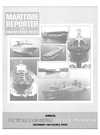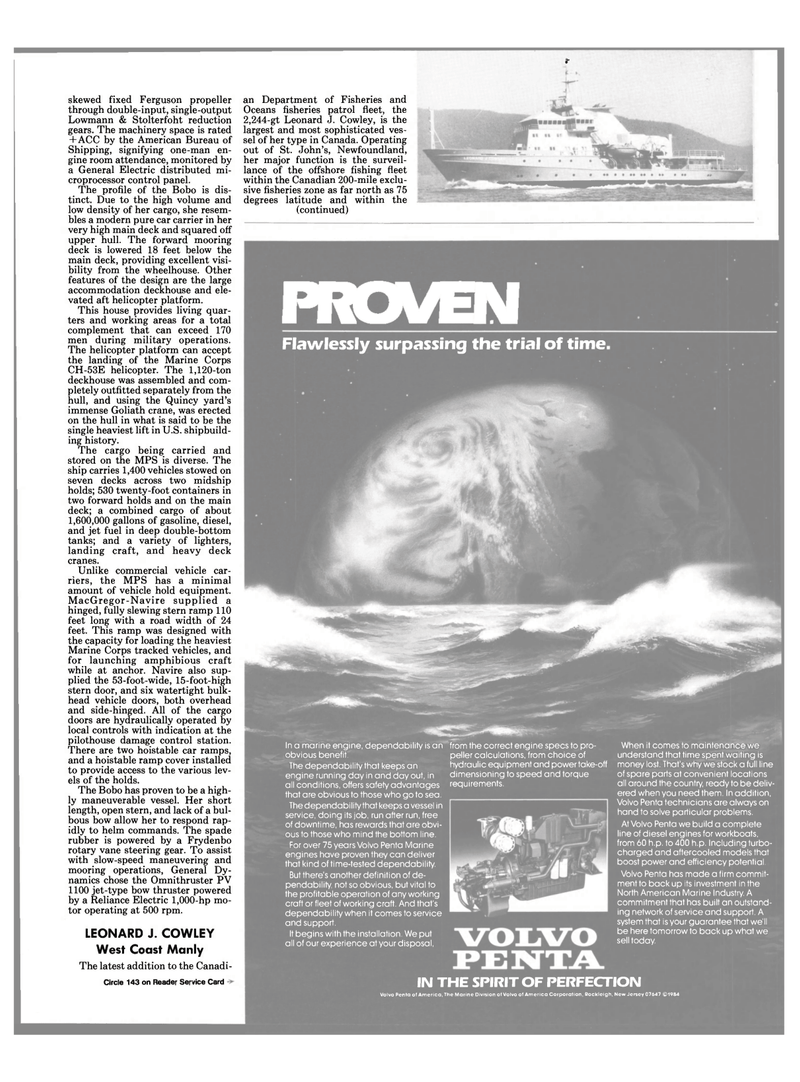
Page 35: of Maritime Reporter Magazine (December 1985)
Read this page in Pdf, Flash or Html5 edition of December 1985 Maritime Reporter Magazine
J- skewed fixed Ferguson propeller through double-input, single-output
Lowmann & Stolterfoht reduction gears. The machinery space is rated + ACC by the American Bureau of
Shipping, signifying one-man en- gine room attendance, monitored by a General Electric distributed mi- croprocessor control panel.
The profile of the Bobo is dis- tinct. Due to the high volume and low density of her cargo, she resem- bles a modern pure car carrier in her very high main deck and squared off upper hull. The forward mooring deck is lowered 18 feet below the main deck, providing excellent visi- bility from the wheelhouse. Other features of the design are the large accommodation deckhouse and ele- vated aft helicopter platform.
This house provides living quar- ters and working areas for a total complement that can exceed 170 men during military operations.
The helicopter platform can accept the landing of the Marine Corps
CH-53E helicopter. The 1,120-ton deckhouse was assembled and com- pletely outfitted separately from the hull, and using the Quincy yard's immense Goliath crane, was erected on the hull in what is said to be the single heaviest lift in U.S. shipbuild- ing history.
The cargo being carried and stored on the MPS is diverse. The ship carries 1,400 vehicles stowed on seven decks across two midship holds; 530 twenty-foot containers in two forward holds and on the main deck; a combined cargo of about 1,600,000 gallons of gasoline, diesel, and jet fuel in deep double-bottom tanks; and a variety of lighters, landing craft, and heavy deck cranes.
Unlike commercial vehicle car- riers, the MPS has a minimal amount of vehicle hold equipment.
MacGregor-Navire supplied a hinged, fully slewing stern ramp 110 feet long with a road width of 24 feet. This ramp was designed with the capacity for loading the heaviest
Marine Corps tracked vehicles, and for launching amphibious craft while at anchor. Navire also sup- plied the 53-foot-wide, 15-foot-high stern door, and six watertight bulk- head vehicle doors, both overhead and side-hinged. All of the cargo doors are hydraulically operated by local controls with indication at the pilothouse damage control station.
There are two hoistable car ramps, and a hoistable ramp cover installed to provide access to the various lev- els of the holds.
The Bobo has proven to be a high- ly maneuverable vessel. Her short length, open stern, and lack of a bul- bous bow allow her to respond rap- idly to helm commands. The spade rubber is powered by a Frydenbo rotary vane steering gear. To assist with slow-speed maneuvering and mooring operations, General Dy- namics chose the Omnithruster PV 1100 jet-type bow thruster powered by a Reliance Electric 1,000-hp mo- tor operating at 500 rpm.
LEONARD J. COWLEY
West Coast Manly
The latest addition to the Canadi-
Circle 143 on Reader Service Card an Department of Fisheries and
Oceans fisheries patrol fleet, the 2,244-gt Leonard J. Cowley, is the largest and most sophisticated ves- sel of her type in Canada. Operating out of St. John's, Newfoundland, her major function is the surveil- lance of the offshore fishing fleet within the Canadian 200-mile exclu- sive fisheries zone as far north as 75 degrees latitude and within the (continued)
PROVEN
Flawlessly surpassing the trial of time
In a marine engine, dependability is an obvious benefit.
The dependability that keeps an engine running day in and day out, in all conditions, offers safety advantages that are obvious to those who go to sea.
The dependability that keeps a vessel in service, doing its job, run after run, free of downtime, has rewards that are obvi- ous to those who mind the bottom line.
For over 75 years Volvo Penta Marine engines have proven they can deliver that kind of time-tested dependability.
But there's another definition of de- pendability, not so obvious, but vital to the profitable operation of any working craft or fleet of working craft. And that's dependability when it comes to service and support.
It begins with the installation. We put all of our experience at your disposal, from the correct engine specs to pro- peller calculations, from choice of hydraulic equipment and power take-off dimensioning to speed and torque requirements.
When it comes to maintenance we understand that time spent waiting is money lost. That's why we stock a full line of spare parts at convenient locations all around the country, ready to be deliv- ered when you need them. In addition,
Volvo Penta technicians are always on hand to solve particular problems.
At Volvo Penta we build a complete line of diesel engines for workboats, from 60 h.p. to 400 h.p. Including turbo- charged and aftercooled models that boost power and efficiency potential.
Volvo Penta has made a firm commit- ment to back up its investment in the
North American Marine Industry. A commitment that has built an outstand- ing network of service and support. A system that is your guarantee that we'll be here tomorrow to back up what we sell today.
IN THE SPIRIT OF PERFECTION
Volvo Penta ot America, The Marine Division ot Volvo of America Corporation, Rockleigh, New Jersey 07647 ©1984

 34
34

 36
36
